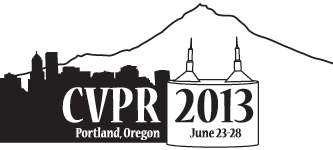-
Robust Canonical Time Warping for the Alignment of Grossly Corrupted Sequences
AbstractTemporal alignment of human behaviour from visual data is a very challenging problem due to a numerous reasons, including possible large temporal scale differences, inter/intra subject variability and, more importantly, due to the presence of gross errors and outliers. Gross errors are often in abundance due to incorrect localization and tracking, presence of partial occlusion etc. Furthermore, such errors rarely follow a Gaussian distribution, which is the de-facto assumption in machine learning methods. In this paper, building on recent advances on rank minimization and compressive sensing, a novel, robust to gross errors temporal alignment method is proposed. While previous approaches combine the dynamic time warping (DTW) with low-dimensional projections that maximally correlate two sequences, we aim to learn two underlying projection matrices (one for each sequence), which not only maximally correlate the sequences but, at the same time, efficiently remove the possible corruptions in any datum in the sequences. The projections are obtained by minimizing the weighted sum of nuclear and 1 norms, by solving a sequence of convex optimization problems, while the temporal alignment is found by applying the DTW in an alternating fashion. The superiority of the proposed method against the state-of-the-art time alignment methods, namely the canonical time warping and the generalized time warping, is indicated by the experimental results on both synthetic and real datasets.
Related Material
[pdf][bibtex]@InProceedings{Panagakis_2013_CVPR,
author = {Panagakis, Yannis and Nicolaou, Mihalis A. and Zafeiriou, Stefanos and Pantic, Maja},
title = {Robust Canonical Time Warping for the Alignment of Grossly Corrupted Sequences},
booktitle = {Proceedings of the IEEE Conference on Computer Vision and Pattern Recognition (CVPR)},
month = {June},
year = {2013}
}
These CVPR 2013 papers are the Open Access versions, provided by the Computer Vision Foundation.
Except for the watermark, they are identical to the accepted versions; the final published version of the proceedings is available on IEEE Xplore.
Except for the watermark, they are identical to the accepted versions; the final published version of the proceedings is available on IEEE Xplore.
This material is presented to ensure timely dissemination of scholarly and technical work.
Copyright and all rights therein are retained by authors or by other copyright holders.
All persons copying this information are expected to adhere to the terms and constraints invoked by each author's copyright.

